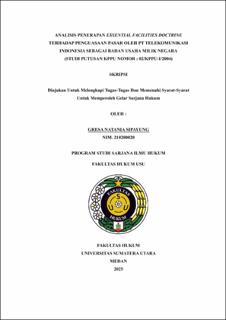| dc.contributor.advisor | Sirait, Ningrum Natasya | |
| dc.contributor.advisor | Azwar, Tengku Keizerina Devi | |
| dc.contributor.author | Sipayung, Gresa Natania | |
| dc.date.accessioned | 2025-06-20T08:46:34Z | |
| dc.date.available | 2025-06-20T08:46:34Z | |
| dc.date.issued | 2025 | |
| dc.identifier.uri | https://repositori.usu.ac.id/handle/123456789/104497 | |
| dc.description.abstract | Essential Facilities Doctrine is doctrine in Competition Law Which
burdensome obligation for business actors controlling important facilities to
provide reasonable access to other business actors who need these facilities to carry
out their business activities effectively. This doctrine have significant relevance
with market control and monopolistic practices regulated in Law Number 5 of 1999
concerning Monopolistic Practices and Unfair Business Competition. Research was
conducted on the existence of this doctrine Which intended to analyze legal
provisions and application limitations Essential Facilities Doctrine In the
perspective of business competition in Indonesia, especially in the case of PT
Telekomunikasi Indonesia as a State-Owned Enterprise as reflected in the KPPU
Decision Number 02/KPPU-I/2004 concerning blocking of codes International
Direct Connection (SLI).
Using normative legal research methods, results study show that Essential
Facilities Doctrine have limitations specific in its application which makes this
doctrine possible to be set aside, especially when there are special provisions in the
law that provide exceptions to certain business actors. Analysis against KPPU
Decision Number 02/KPPU-I/2004 shows that the Commission Council was
correct in evaluate that SLI is via a local fixed network meet the criteria essential
facility, namely facilities that are difficult to duplicate, controlled by dominant
business actors, and essential for competitors to be able to compete. KThe
complexity of each different market control case requires the KPPU to make
provisions and characteristics of important facilities more explicit and
comprehensive in order to provide legal certainty in the implementation.Essential
Facilities Doctrine in the future. | en_US |
| dc.language.iso | id | en_US |
| dc.publisher | Universitas Sumatera Utara | en_US |
| dc.subject | Essential Facilities Doctrine | en_US |
| dc.subject | Market Domination | en_US |
| dc.subject | PT Telekomunikasi Indonesia | en_US |
| dc.subject | BUMN | en_US |
| dc.subject | Business Competition | en_US |
| dc.title | Analisis Penerapan Essential Facilities Doctrine terhadap Penguasaan Pasar oleh PT Telekomunikasi Indonesia sebagai Badan Usaha Milik Negara (Studi Putusan KPPU Nomor 02/KPPU-I/2004) | en_US |
| dc.title.alternative | Implementation Analysis Essential Facilities Doctrine Regarding Market Control by PT Telekomunikasi Indonesia as a State-Owned Enterprise (KPPU Decision Study Number: 02/KPPU-I/2004) | en_US |
| dc.type | Thesis | en_US |
| dc.identifier.nim | NIM210200020 | |
| dc.identifier.nidn | NIDN0017016203 | |
| dc.identifier.nidn | NIDN0001027001 | |
| dc.identifier.kodeprodi | KODEPRODI74201#Ilmu Hukum | |
| dc.description.pages | 160 Pages | en_US |
| dc.description.type | Skripsi Sarjana | en_US |
| dc.subject.sdgs | SDGs 8. Decent Work And Economic Growth | en_US |


